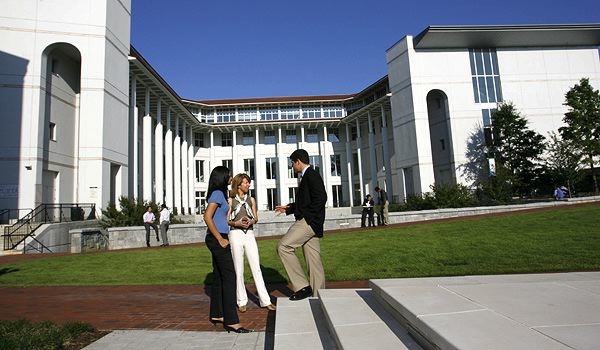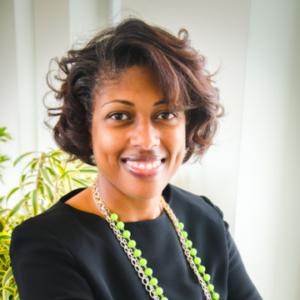
Emory’s Goizueta School of Business launched a fully online EMBA program starting this fall. Courtesy photo
So, are you catering mostly to people in your backyard, so to speak, or do you attract candidates from all over?
The majority of the people live in the Atlanta metro area, or even in Georgia, but we have had students that come from Tennessee, Alabama, and Florida, to participate in the on-campus format. We did have one student who came all the way from California every other weekend, but that was unusual. Typically most of the fully on-campus students are within a two hour drive.
What we find for the students who choose the on-campus format is that they really value the face-to-face interactions with their faculty and their classmates, and that’s why they select that option.
How long have you offered this EMBA option?
Since 1978. Back then, we called it the weekend Executive MBA.
What trends have you noticed in terms of demand? Is it increasing or decreasing?
Definitely it’s on the uptick since the pandemic. What I would say is that our enrollment tends to be reflective of the activities going on within the economy: So when the economy is great, people have amazing jobs, are extremely engaged in their work and in their career paths, then they typically do not see the necessity of coming back to school. But when the economy is struggling, or when the job market isn’t as strong as it could be, then that’s usually when we see students that are really seeking more business education and growth within their areas of expertise, or they’re looking to completely pivot and try a new industry.
What did you see in the latest admission cycle then, with all the headlines hinting at a labor market that could slow down in the near future?

Jaclyn Conner, associate dean of Executive MBA programs at Emory’s Goizueta Business School
This past cycle, it has been going up since the pandemic, but I think everyone thought it would have gone up at a higher rate. This particular August, for 2022, enrollments were good but they weren’t amazing or unusually high.
Having said that, our program, I think, is also different and unique with our three formats because in total, our enrollments are up. I think they’re up because we have so much flexibility to offer students. The way we conduct our on-campus, hybrid, and online formats is that students can switch formats semester by semester. Students have found that to be very beneficial for their work-life balance. If you are an on-campus student, for example, and you get a new job while you’re in the program, it’s very easy to then switch to hybrid or fully online.
Vice versa, we’ve seen students who are having just a really difficult time in life, not necessarily at their job, but with life events, they need to adjust their format. For example, they could have been in the hybrid format where the majority of those classes are at night, but night classes no longer work for them, so it’s better for them to come to campus every other weekend. So, we offer a lot of flexibility, and I think that’s why we saw an overall increase in enrollment.
So, do you look at all formats as being a bit like one big EMBA cohort?
Yes. The differentiators for the students are literally just what delivery format do you prefer? Do you prefer to have classes every other weekend? Do you prefer to have classes in the hybrid format where you want opportunities to have classes in person but you also have classes weeknights, eight to 10pm? Or do you prefer to have a learning delivery where everything is completely online and you’re never required to step foot on campus? So when we’re looking at our numbers we’re looking at across all three formats.
Tell us a little bit more about the hybrid format.
The current hybrid model started in 2020, but we actually had a version of hybrid that started back in 2002. It was called our Modular Executive MBA, where students would come physically to campus every other month, but they would come for seven straight days — basically like an intensive week. After that, all their classes were online. The reason why we did away with that model was we wanted to have our hybrid students and our on-campus students, and now even our online students, be much more integrated than they were before. Just to increase opportunities for networking and for engaging in events together.
Now the way it works is a hybrid student basically comes to campus the first weekend, the middle weekend, and the last weekend of the semester. In those interim weeks, all of their classes are online — 8 to 10 pm. — three days a week.
How many students are in the hybrid format?
So those numbers have varied. This is now our third year doing this, and we initially started at 16. Last year we had 22, and this year we’re at 15. The numbers kind of go up and down, but what typically happens is, once the school year gets going, we tend to see one to three on-campus students transfer into the hybrid format.
In February, you announced the launch of a fully online EMBA. So, this is your first cohort in that format, correct?
Yes. Our first cohort for online started this August, and we’re proud to be the first executive MBA program in the top 25 schools to go 100% online.
We made that decision because we kept listening to our students as well as other members of the working professional population, who said they just needed more flexibility. The irony of all of this was that the first person to apply to our fully online format actually worked at Emory University. He’s a physician, and he needs flexibility. so it was perfect for him.
So how many students did you enroll?
We have 22 students for this go around, and we’re obviously looking to grow in all the areas but definitely online. The opportunity with online is we can scale so much greater than we can in person where we are bound by how many seats we can get into a room. With online, we’re really hoping to take advantage of that opportunity to scale while still maintaining our values of having an intimate learning experience.
NEXT PAGE: Emory’s Global Classrooms + Holograms and other new tech





Questions about this article? Email us or leave a comment below.